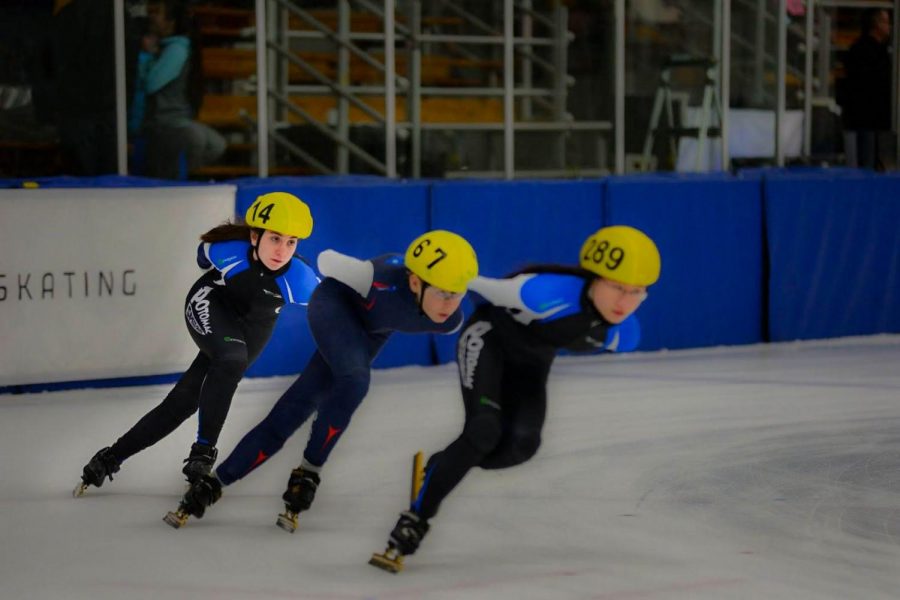Sophomore speed skater stays on track for Nationals
Photo courtesy of Samantha Leventis
Samantha Leventis gets locked in as she flies around the rink. Leventis competes annually at the speed skating national championships.
March 25, 2018
Flying around corners of the slick ice rink at speeds over 20 mph, sophomore Samantha Leventis balances on slim one-millimeter-wide pieces of metal. Around her, four other skaters are diligently trying to keep the right pace, staying in front of the stragglers without being forced to take the difficult position of lead skater.
The pressure is on—chances are, Leventis will already know some of the skaters in the rink or participating in the competition within the world of speedskating. At the national level, the physical balancing feat aside, keeping her focus in the narrow and competitive world of speedskating is a triumph in itself.
After years of pursuing the unconventional sport, Leventis has managed to conquer its physical, mental and organizational challenges and is preparing for her third year competing March 23-25 at the U.S. Short Track Age Group National Championships.
Leventis first started skating after deciding that trampolining was too dangerous and wrestling wasn’t for her—both sports she had gotten into towards the end of elementary school after losing motivation for more typical sports like soccer. Then, she stumbled upon speedskating during an internet search with her mom.
“We looked it up, and turns out the Maryland-Virginia area is like a hotspot for speedskating,” Leventis said. “I went to the first practice, and it was a really different kind of sport.”
Leventis appreciated the welcoming team atmosphere upon joining and felt encouraged to continue the novel activity, she said.
“I think it’s just an interesting combination between strategy and strength—I thought it was a really unique sport; just the movements you do are very different from any other sport,” Leventis said. “I like the mix of strategy and physicality, and I thought it was really cool to go fast.”
Speed skating often requires much time and distinct composure both on the ice and in the form of physically draining “dryland” exercises to help with strength.
As soon as skaters attend the first competitions of their careers, the atmosphere quickly becomes fairly intense and emulous, Leventis said. One of her greatest challenges has been maintaining self-confidence while competing against much more experienced skaters, as the small size of the sport’s participation makes it impossible to have many different subdivisions by years of experience.
She has only around three competitions a year, so each one counts for a lot, Leventis said.
“Even though this is one of the few competitions in the year, you have to keep calm because if you’re really nervous, which I used to be when I first started, when you’re skating a race, you’ll just fall,” she said. “Something I learned after a couple years of competing is just that I had to get in the right mindset.”
Leventis focused her mental strategy on staying positive and building her confidence in competition rounds, which has guided her overall success over the years.
“[The pressure] would get in my head and then, of course, I would lose. After a while I would develop strategies to tell myself that I could win and then I started winning races and doing much better.”
Harnessing nervous energy and gathering composure is a key element of successful skating, her coach—Olympic bronze medalist Simon Cho—has been able to stress.
“Nervous energy is what’s eventually going to bring the best out of you, so you might as well embrace it,” Cho said of dealing with nerves in the sport.
An unexpected perk of Leventis’ speedskating has been her immersion in Korean culture. Speedskating is very popular in Korea, and even in the local area there’s a high concentration of Korean coaches. Over the years, not only has she learned to appreciate Korean food and music that she shares with her team at practices, but she has also learned how to effectively communicate with some coaching staff members for whom Korean is their first language, Leventis said.
“I think it was a good experience because it taught me different ways to communicate and it helped me see different cultures,” she said.
While she’s enjoyed it, taking off with the sport meant year-round commitments resulting in sometimes as much as four-hour long practices about six times a week, during the school year.
Such an ambitious commitment made her realize she wanted to reevaluate her usage of time as she went into sophomore year.
“So I took a step back, telling myself ‘I’ll stay in this, but not as seriously as before so I can focus on my grades and try new things,’” Leventis said.
Leventis has managed to continue improving, however, earning a qualifying time in last year’s Nationals. She competed again in October—another qualifying requisite for Nationals—and is gearing up for this year’s Nationals competition in late March, which for her means competing in the 500 meter, 1000 meter and 1500 meter races.
Leventis plans to step up her preparations this March, and her coaches stay flexible to help her manage her changing schedule.
“Cutting back means you’re either not improving or even getting worse,” Cho said. “On top of that, it can be tough to watch the people you used to beat starting to skate faster than you. When there’s a big race coming up, Samantha makes time to come to a lot of practices so she can get into shape.”
Developing a scheduling compromise required her drive and motivation—two things that have always been a core part of Leventis’ performance ethic, said former teammate Christine Lee.
“Even when there were breaks, she would always be working on technique and stuff which I found really cool. She has goals, and she doesn’t stop until she reaches them,” Lee said. “She’s always really positive even when it’s hard to be.”
Speedskating remains one passion that Leventis says has made up a part of who she is. Leventis and her coach agree that it’s something she’s proud to have accomplished.
“It’s really important for high schoolers to figure what they want out of life and what they want to pursue as hobbies and careers,” Cho said. “Samantha has done a great job of managing her expectations and just enjoying the sport. It’s impressive.”







